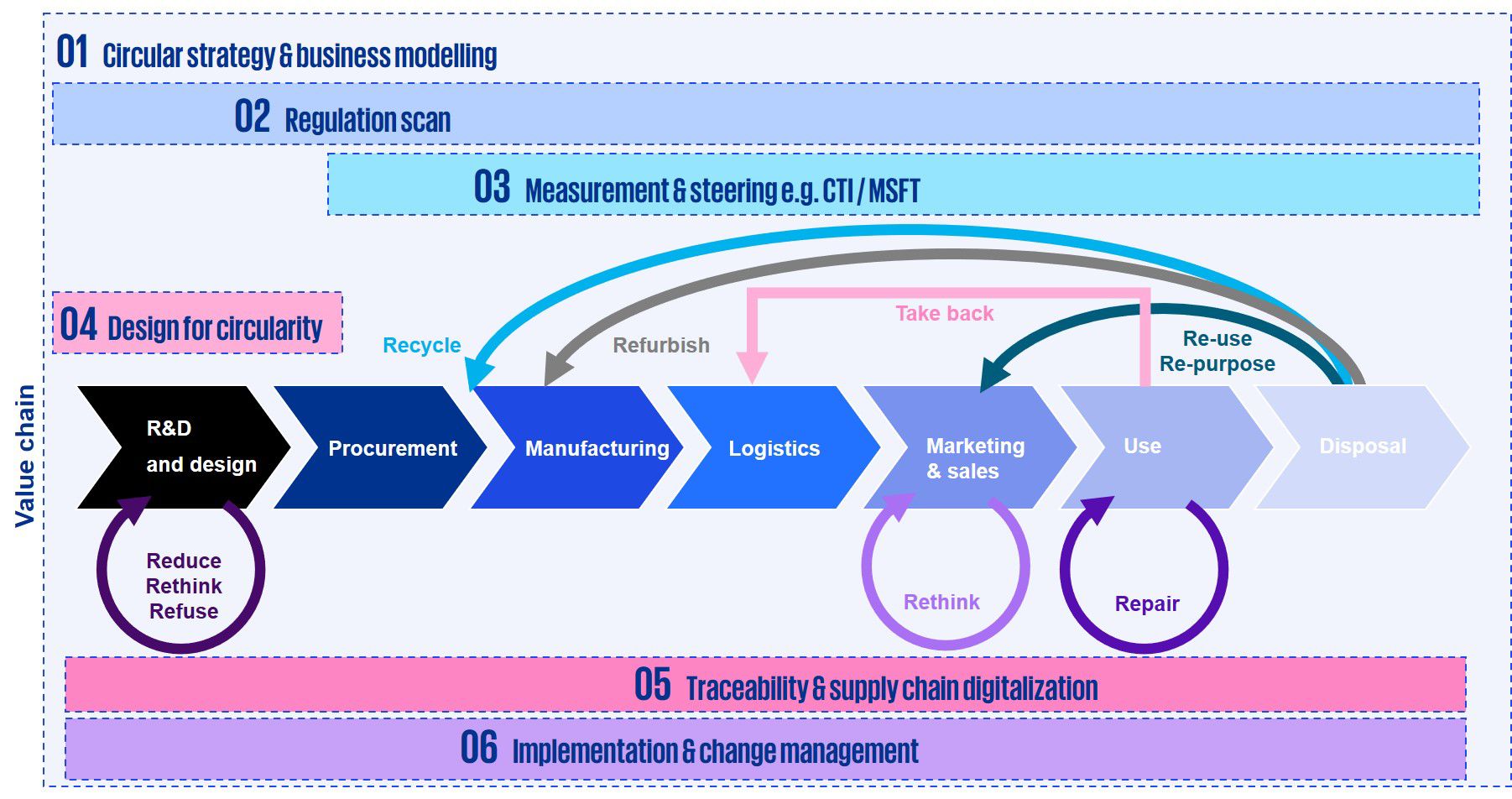The circular economy is a key element we need to consider for responsible and sustainable growth. With sourcing, manufacturing and product sales contributing up to 45% of global greenhouse gas emissions, the current linear economy model of extracting resources, transforming them into products and disposing of or partially recycling them is no longer viable or sustainable.
Numerous industries are either already regulated or will soon be required to adopt circular practices, particularly in Europe as a result of the EU Green Deal and the Circular Economy Action Plan which applies to almost all natural resource intensive sectors such as construction, food, textiles, batteries for EVs, electronics & appliances, plastic products & packaging.
With our expertise in Switzerland and our international network of circular economy experts, we will support you in your transition, starting from the assessment stage and then moving on to strategy, business modeling, solutions design, implementation and change management.
Opportunities of a circular economy
The circular economy presents an exceptional opportunity for innovation, cost reduction, and sustainable growth. Incorporating circular thinking into your transformation agenda will help unlock hidden value and significant benefits such as:
- Improved cash flows: recurring revenue from circular products, lower costs through circular sourcing and efficiency measures
- Enhanced access to capital: better access to capital sources and on more favorable terms
- Access to incentives and public funding for product sustainability transition
- Employer of choice: improved recruitment opportunities and retention of talent
- Reputational value: positive image in the eyes of existing and prospective investors, business partners and customers
- Competitive differentiator: demonstration of industry leadership, benefit to society and long-term competitive advantage over peers
Learn more on how we support you transitioning towards circular business practices
Sustainable transition to the circular economy - Our approach
We are happy to support you at every step towards becoming more circular:
1. Circular strategy and business modelling helps to define a clear plan and roadmap: Where do we stand today? Where do we want to go? How can we get there? How do we unlock value with circular approaches?
2. A regulation scan prepares your business for existing and upcoming regulations, taxation and incentives. It also accelerates the transition to a circular economy by combining mandatory reporting standards, (e.g., CSRD) with your circular economy approaches
3. The measurement and steering of circular flows support informed decision-making, performance evaluation, goal setting, communication, and continuous improvement, leading you to a resource-efficient future. KPMG was at the forefront of the development of the WBCSD Circularity Transition Indicators (CTI) framework, the first global open standard for measuring and monitoring circularity.
4. Designing for circularity enables the integration of circular practices right from the product R&D and design process, ensuring that products and systems are inherently sustainable, resource-efficient, and capable of being easily repaired, reused, refurbished, and recycled.
5. Traceability and supply chain digitalization helps to create closed-loop systems along the supply chain, as they provide visibility, transparency, and real-time information, empowering businesses to effectively track and optimize the flow of materials. For example, digital product passports provide comprehensive information about a product's lifecycle, composition, and origin.
6. Implementation and change management support help with the adoption of new circular practices. Focused training courses and engagement workshops facilitate smooth transitions and drive continuous change across the organization with strong central steering to remove barriers.
KPMG Circularity Tracker: Make your circular performance visible
The KPMG Circularity Tracker is a future-ready tool co developed with Microsoft based on the “Cloud for Sustainability” Solution, for organizing and enhancing circularity across your organization. It helps automate data collection from diverse sources and performs model-based data calculations using universally accepted measurement frameworks for circularity performance, such as the Circular Transition Indicators (CTI) framework.
At the same time, the tool is flexible and can be tailored to company-specific metrics or reporting standards such as the Corporate Sustainability Reporting Directive (CSRD). With the KPMG Circularity Tracker, you can easily organize diversified data sources, reduce the number of manual interventions in circular data processing, and track circularity at various levels, from products and locations to materials and more.
How can KPMG support you?
- Analysis of the circularity of your supplies and value chain
- Implementation of current and future regulations
- Definition of your future transformation strategies and innovative circular business models
- Circularity measurement and reporting; with technology partnerships, for example to manage supply chain traceability and digital product passports (DPPs), we can support you comprehensively
- Development of circular design and creation of coalitions to reduce costs and move to a circular supply chain at scale
- Implementation of transformations and ensuring efficient and successful change management for your company
Your benefits
The benefits of working with us are manifold:
- Alignment of your senior management and all functions focusses attention on the needs, principles and benefits of the circular economy for your business.
- A detailed analysis of the risks and opportunities for your products and packaging, including a simulation of circular design options
- A transformation strategy including business case scenarios, timelines, costs and revenues
- Automated data management, product traceability and ESG reporting
- Change management through training, coaching and support for transition projects
- Fast and easy access to an international network of specialists within KPMG
Contact our ESG experts
Organize a discussion with us today, and we'll look at the opportunities offered by circular economy models for your business, the risks of remaining linear, and the solutions.
We will gladly remain at your disposal to answer any further questions you may have.


